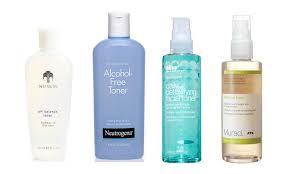
What is Toner?
Toners are often misunderstood and most people don't know if they should use it or how to use it. Before moisturizing and following your facial cleanser, a face toner is a quick, absorbing liquid that helps to remove excess dirt, traces of oil and makeup, correct and balance the pH of your skin, and helps control acne. In other words, a facial toner thoroughly cleans the skin and helps remove built up surface dead skin cells. By helping to clean and close pores, it's especially beneficial for acne-prone skin.
Difference Between Toner Vs Astringent
A simple way to describe the difference between a face toner and an astringent is that an astringent is usually formulated with solvent alcohols. Toners can also contain alcohol, but they are also available in alcohol-free formulas. This means that an alcohol-free toner is milder for your skin than an astringent. They can also be used every day to help finish the cleansing of your skin. Like a facial toner, astringent minimize the appearance of pores, however, the alcohol can be too drying. Astringent used daily can be harsh and can excessively dry your skin, specially if you have sensitive skin.
Examples of astringents include calamine lotion, distilled vinegar, rubbing alcohol, silver nitrate and witch hazel. Astringent solutions are recommended for insect bites, fungal infections, and minor skin irritations.
Choosing a Toner for Your Skin Type
First of all, it's important to always use a alcohol free face toner. The other ingredients should be picked based on your skin type.
- For acne-prone skin, choose an alcohol free toner with alpha hydroxy acid (AHA). This will leave your skin clean and glowing without flaking. A gentle tingle for a few seconds will let you know it has just the right amount of pH of slight acid solution. This form of acid is gentle even for sensitive skin, unlike irritating ingredients like retinoids.
- Salicylic acid is often recommended in a facial toner for acne prone skin. However, this ingredient can be harsh, specially for sensitive skin.
- Other ingredients for normal to combination skin may include coenzyme Q10, hyaluronic acid, glycerin and vitamin C.
- Although essential oils and plant extracts have had marketing to help give them a 'natural' and 'good for you' feel, these ingredients may result in skin irritations.
How to Use a Face Toner
- Start by cleaning your face with a
gentle cleanser for sensitive skin suited for your skin type. Choose one free of harsh detergents, such as sodium lauryl sulfate and fragrance. - Dampen a cotton ball with the alcohol-free toner, and apply it on your face.
- Allow it to dry.
- If you have combination or oily skin, you can use alcohol-free toner at day and night. For dry skin, it's best to only use it once a day at night time.
- Always follow with moisturizer for your skin type.
What You Should Know About Cleansers and Toners
If you have sensitive skin, what you use as a cleanser and toner can make a major impact. Sensitive skin conditions are reported to dermatologists, with millions of people complaining of various reactions with products they used to use. Healthy, youthful, beautiful skin starts with washing your sensitive skin with the right cleanser.
It's important to find a gentle soap-free cleanser and alcohol-free toner for sensitive skin that won't strip your skin of vital nutrients and natural oils. Your skin type should determine which cleanser you should use.
Dermatologists agree certain ingredients are irritating to sensitive skin and may cause problems. Sodium lauryl sulfate (SLS) is one such ingredient added to cleansers and bar soaps. This foaming chemical is actually a harsh detergent and may be too irritating for your sensitive skin. Opt for an SLS-free/soap-free cleanser that is preferably free of plant ingredients. Plants or botanicals, herbal extracts, and essential oils often have side effects. Remember most medicinal drugs are derived from plants.
Make sure to wash your face with a soap-free cleanser at night to remove build-up debris, makeup and pollutants. A morning cleanse can also help your skin be fresh and ready for makeup and the day. Always remember to follow with a
Never use very hot or very cold water to rinse. A lukewarm temperature feels more comfortable on the skin and is preferred. Extremes of water temperature may cause broken capillaries. Always dry your skin with a soft cloth and don't rub but gently dab to dry.

